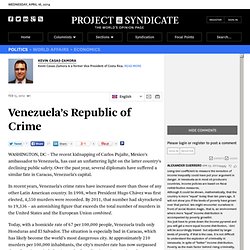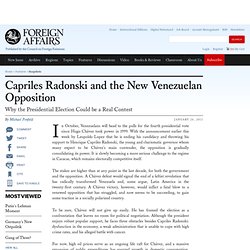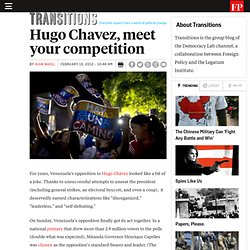

Venezuela’s Republic of Crime - Kevin Casas-Zamora. Exit from comment view mode.

Click to hide this space WASHINGTON, DC – The recent kidnapping of Carlos Pujalte, Mexico’s ambassador to Venezuela, has cast an unflattering light on the latter country’s declining public safety. Over the past year, several diplomats have suffered a similar fate in Caracas, Venezuela’s capital. In recent years, Venezuela’s crime rates have increased more than those of any other Latin American country. In 1998, when President Hugo Chávez was first elected, 4,550 murders were recorded. Today, with a homicide rate of 67 per 100,000 people, Venezuela trails only Honduras and El Salvador. The Venezuelan security debacle is as enlightening as it is tragic. Standard narratives about high crime in Latin America put income inequality at the heart of the problem, and higher human-development levels at the core of the solution.
Yet income inequality in Venezuela has fallen dramatically in recent years. Capriles Radonski and the New Venezuelan Opposition. In October, Venezuelans will head to the polls for the fourth presidential vote since Hugo Chávez took power in 1999.

With the announcement earlier this week by Leopoldo Lopez that he is ending his candidacy and throwing his support to Henrique Capriles Radonski, the young and charismatic governor whom many expect to be Chávez's main contender, the opposition is gradually consolidating its power. It is slowly becoming a more serious challenge to the regime in Caracas, which remains electorally competitive itself. The stakes are higher than at any point in the last decade, for both the government and the opposition. A Chávez defeat would signal the end of a leftist revolution that has radically transformed Venezuela and, some argue, Latin America in the twenty-first century. Hugo Chávez, meet your competition. For years, Venezuela's opposition to Hugo Chávez looked like a bit of a joke.

Thanks to unsuccessful attempts to unseat the president (including general strikes, an electoral boycott, and even a coup), it deservedly earned characterizations like "disorganized," "leaderless," and "self-defeating. " On Sunday, Venezuela's opposition finally got its act together. In a national primary that drew more than 2.9 million voters to the polls (double what was expected), Miranda Governor Henrique Capriles was chosen as the opposition's standard-bearer and leader.
(The photo above shows his followers celebrating the win.) Capriles's victory over four other candidates was impressive: at 62% of the opposition vote, he doubled his nearest rival's tally, earning a strong claim to be the opposition's consensus candidate. From day one, Capriles has run a general-election campaign, ignoring the more radical elements within the opposition movement. Capriles won in a landslide. He might have a point. Why cancer or no cancer, Chavez will run for re-election. When Patrick Duddy, the former U.S. ambassador to Venezuela, thinks about the ailing Venezuelan president, Hugo Chavez, he is reminded of the 1961 epic El Cid.

In the climatic finish, a dead hero's men, fearing they cannot defeat North African invaders without him, secure his corpse upon his horse, and send it onto the battlefield in order to intimidate their enemies. Sure enough, the dead El Cid's Castillian army goes on to final victory. With seven months to go until October presidential elections, Chavez returned to Caracas over the weekend after a second cancer operation in Havana. Chavez's health has thrown the election into disarray, raising questions about what will happen not only in Venezuela should he be incapacitated, but in the country's projection of influence around the region. Duddy is sure of only one thing -- that, whether or not Chavez is healthy, he will in fact appear as the ruling candidate for president on Oct. 7.
Juan Barreto AFP/Getty Images. The man who could be Venezuela's next president. Venezuela President Hugo Chavez's disclosure that his cancer has recurred raises hard questions about his ability to campaign for re-election in October.

If he lacks the stamina or is incapacitated, what happens next -- will fair elections proceed, or will his ruling circle frustrate any potential transfer of power? In short, if there is new leadership, can one imagine a shift in which Venezuela stops using its oil wealth to support a violent Colombian guerrilla movement? And will Venezuela lift constraints on oil production, and become a tipping point in the fast-changing geopolitics of oil? The evidence to date is that Chavez, who has led Venezuela for 13 years, has prepared a tough strategy "to defend the revolution," says Stephen Johnson, director of the America's Program at the Center for Strategic and International Studies. The 39-year-old Radonski (pictured above), who is governor of Miranda state, appears to represent a serious popular threat to Chavez.